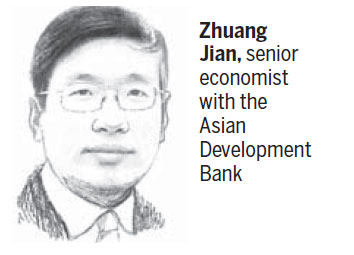The changes and challenges for economy in 2013
Updated: 2012-12-20 08:54
(China Daily)
|
||||||||
A1
China's economy saw a significant slowdown in 2012 and its economic growth rate declined to less than 8 percent. The economy was mainly driven by consumption and investment as weak external demand continued to put pressure on the country's exports. Tightening measures on real estate have affected the country's fixed-asset investments and, as a result, consumption's literal contribution to GDP has been boosted. But still there is not much of a driving force for economic growth. A large portion of investment has been wasted without carefully calculating possible output and long-term interests. The quality and cost of local government financing vehicles needs to be given more attention.
|
 |
A2
As the hope of seeing reforms is rising, the new leadership has issued a call for fresh economic reforms. The biggest priorities are for reforms in income distribution, financing and taxes, as well as the financial system. The first step should move toward increasing people's incomes and expanding value-added tax reforms to more industries.
A3
According to the Asian Development Bank's forecast, China's economy should expand by 7.7 percent in 2012 and 8.1 percent in 2013, but this may be revised later. The coming year will be the (third) year of the 12th Five-Year Plan (2011-15), and construction of big investment projects usually begins in the second or third year, so investment is expected to increase steadily in 2013. If the new income distribution plan offers help to increase low-income people's incomes, that will give consumption a boost.
Inflation could rise slightly in the next year. Food prices will remain uncertain. If there is extreme weather, the rising price of grains and vegetables may offset the falling prices of manufactured goods.
A4
China's urbanization rate has surpassed 50 percent, but the data also take into account a large percentage of migrant workers who haven't become official urban residents. Without reforms to the hukou (household registration) system, these migrant workers cannot really become urban residents. According to research, a city dweller spends about three times as much as a rural resident. Rapid urbanization doesn't only lead to housing and real estate development. It should also be accompanied by more job opportunities, public services and improvements to the quality of educational and medical systems. All of this will bring opportunities to more public and private investors.
A5
According to our research, Asian economies, excluding Japan, will grow by 6 percent this year and 6.6 percent in 2013. Both figures are 0.1 percent lower than what was expected in October. The US economy is seeing signs of recovery and the European economy won't be worse than it was this year, although its debt troubles persist. I think external conditions will see some improvements in the coming year.

 Relief reaches isolated village
Relief reaches isolated village
 Rainfall poses new threats to quake-hit region
Rainfall poses new threats to quake-hit region
 Funerals begin for Boston bombing victims
Funerals begin for Boston bombing victims
 Quake takeaway from China's Air Force
Quake takeaway from China's Air Force
 Obama celebrates young inventors at science fair
Obama celebrates young inventors at science fair
 Earth Day marked around the world
Earth Day marked around the world
 Volunteer team helping students find sense of normalcy
Volunteer team helping students find sense of normalcy
 Ethnic groups quick to join rescue efforts
Ethnic groups quick to join rescue efforts
Most Viewed
Editor's Picks

|

|

|

|

|

|
Today's Top News
Health new priority for quake zone
Xi meets US top military officer
Japan's boats driven out of Diaoyu
China mulls online shopping legislation
Bird flu death toll rises to 22
Putin appoints new ambassador to China
Japanese ships blocked from Diaoyu Islands
Inspired by Guan, more Chinese pick up golf
US Weekly

|

|







